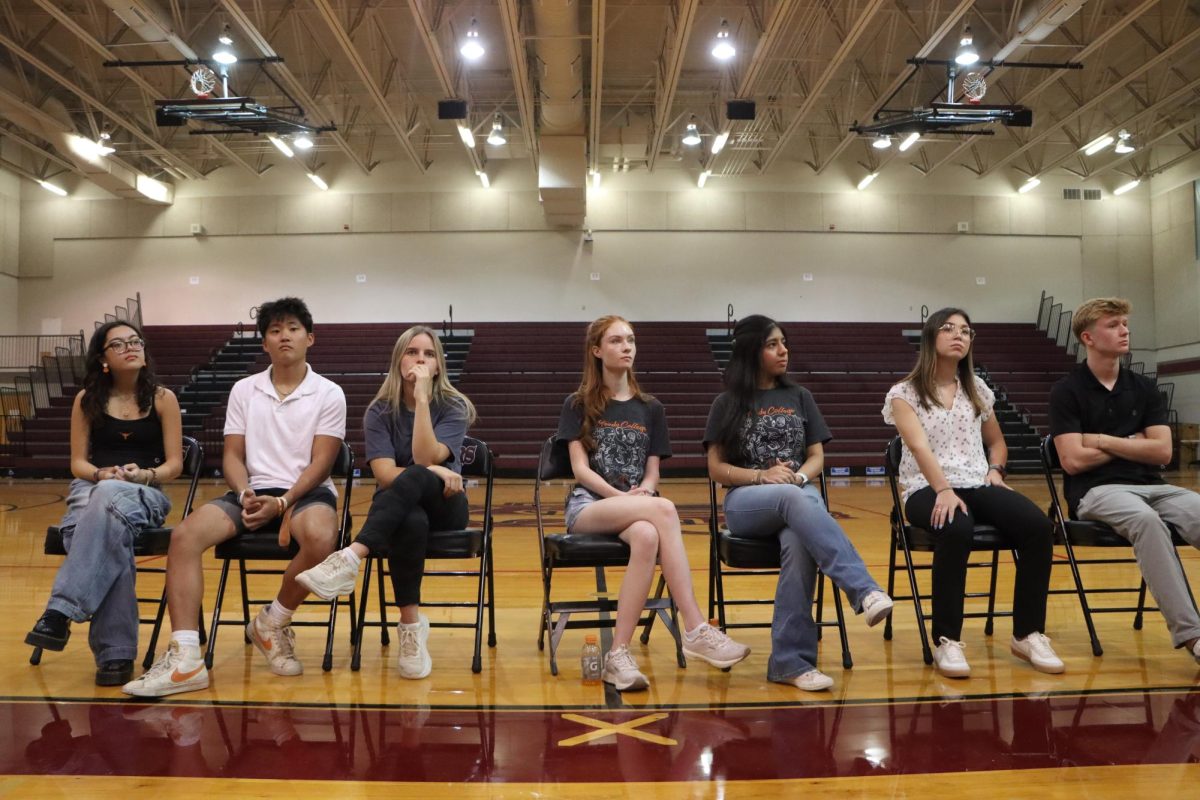Each summer before the school year, incoming Raiders get their first taste of campus during Raider Camp, an event where they tour the school, hear from counselors and meet classmates. This year, instead of the usual club fair, a new Q&A panel was featured with graduates from the class of 2025, sharing their experiences and insights to help students succeed.
“All of them had very different experiences here while they were at Rouse,” College and Career Transition Coordinator Christina Wallace said. “It’s always beneficial to hear other people’s stories because no two people are going to have the same story. It’s good to hear that you can go many different directions and still be successful.”
The panel featured alumni, Connor Privott, Jade Corriveau, Aradhya Bharti, Connie Cooper, Natalie Erzal, David Moon and Zoe Clark, all of whom were heavily involved in the Career and Technical Education (CTE) Department.
“The pathway to success can be a creative one,” Cooper said. “It can be one that is driven by passion and interests that aren’t necessarily serious. That means it’s not just related to the core subjects in school. It’s more about what you’re interested in and being able to explore that through CTE.”
CTE offers students a sequence of rigorous courses and hands-on learning experiences across 12 different career clusters ranging from Education and Training to Health Science.
“A lot of people think that science-based careers and majors and interests are the only way to get into college, or the only way to stand out,” Clark said. “With so many people focusing on science, it’s actually making them blend in a lot more. It’s really important to raise awareness, that there’s more pathways out there than the one (students) think they have to take and that they should be true to themselves.”
While four of the panelists, Bharti, Cooper, Erzal and Moon, are headed to the University of Texas at Austin this fall, Privott and Corriveau are entering the workforce directly out of high school through their experience in the automotive program.
“There’s definitely ways out there to not only work with your hands, but as well as meet new people and move your way up through the workforce without going to college,” Privott said. “There’s plenty of options out there, and thankfully I found it pretty early on.”
CTE prepares students for the workforce through authentic work based learning, industry certifications and opportunities to join Career and Technical Student organizations (CTSOs).
“I walked in with a resume at a dealership,” Privott said. “They looked that I had experience and an automotive class in high school. Not in the shop, but in a class. They saw that I had certifications. These CTE classes give you that chance to go in and work for a Fortune 500 company. They give you the amazing opportunities to go do whatever you want. CTE opens those doors.”
Corriveau, who was heavily involved in automotive throughout high school, now works in the same industry as Privott.
“I came in freshman year not knowing what I do, so I joined JROTC, which is a part of CTE,” Corriveau said. “I simply wanted to learn how to change a tire, like how to take care of basic maintenance on a vehicle because that can be pretty expensive. Now, I’m coming out with a 401k, health insurance and full benefits right out of high school. I’m getting jobs that you normally get after college because I have certifications because I went through this program.”
According to Leander ISD, CTE not only prepares students for future careers but also helps promote leadership development.
“I remember as a freshman, I would go and interview people around the school and I was mortified,” Cooper said. “But I learned gradually through that, that I was capable of interviewing people and communicating with them. CTE in general allows you to be a more well-rounded person because you get real world experience doing these interesting things and you talk to people you otherwise wouldn’t talk to learn things about them.”
Principal Vincent Hawkins closed out the panel by sharing what truly sets students apart during the college admissions process, based on his experience combing through data from the University of Texas at Austin and Texas A&M University.
“If you’re your true, authentic self It’s going to eventually work out,” Hawkins said. “I can see all of our students who got in and who didn’t. There is a pattern. It’s when the kids who were very focused and could show their passion and all the things that they could do, you could tell. Those students were getting into the universities of their first choice.”
Hawkins emphasized the importance of narrowing down interests over time, especially by senior year.
“Do all the things freshman year,” Hawkins said. “But after that it’s time to start figuring it out. And when you get to be a senior, it is time to boom, narrow the focus, here’s where I’m at, and that’s what jumps off the page.”



aubrey • Aug 27, 2025 at 10:45 am
this ate